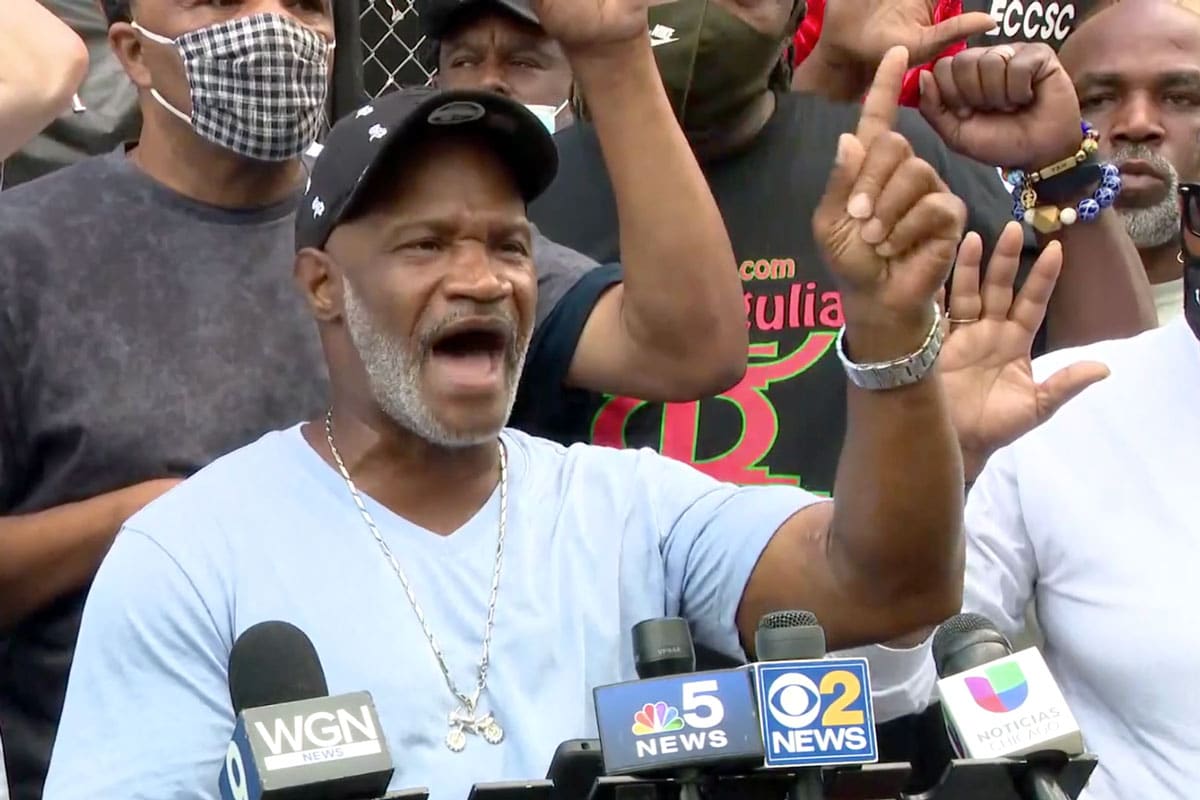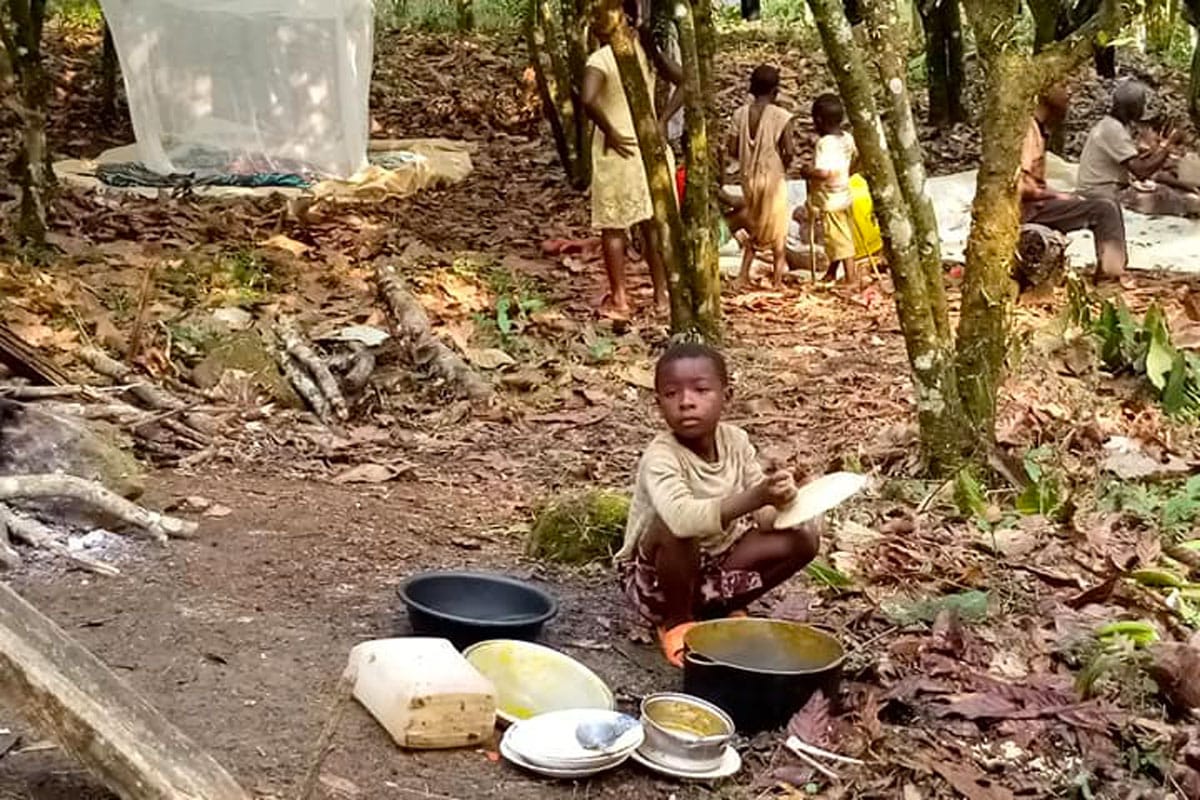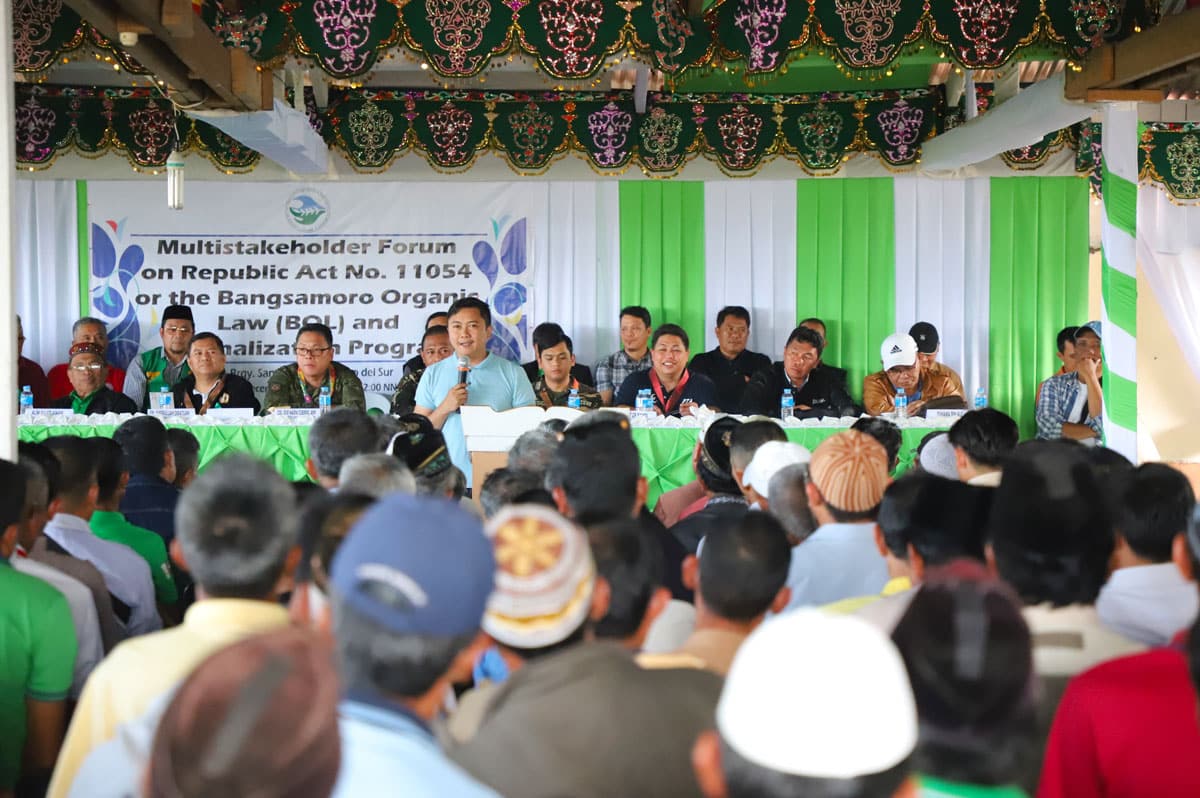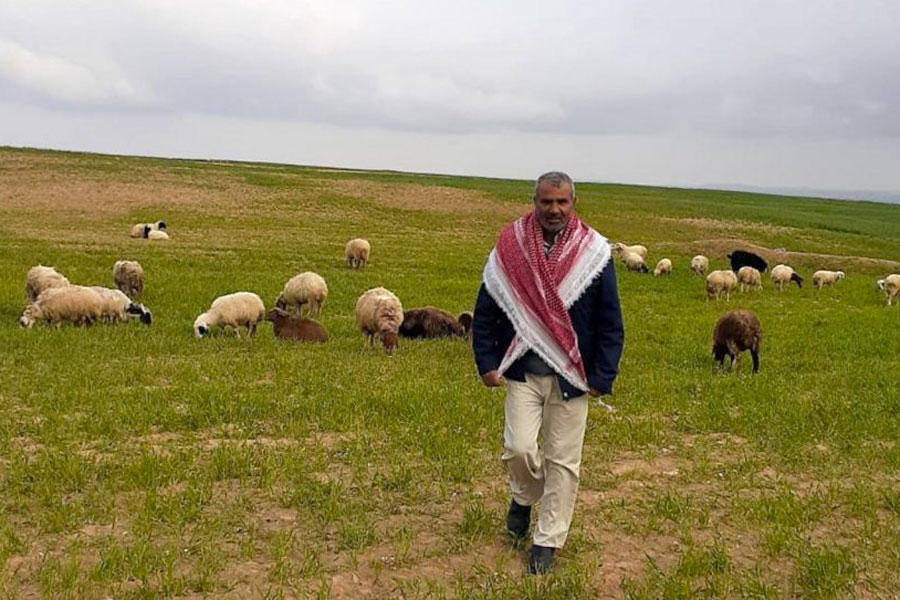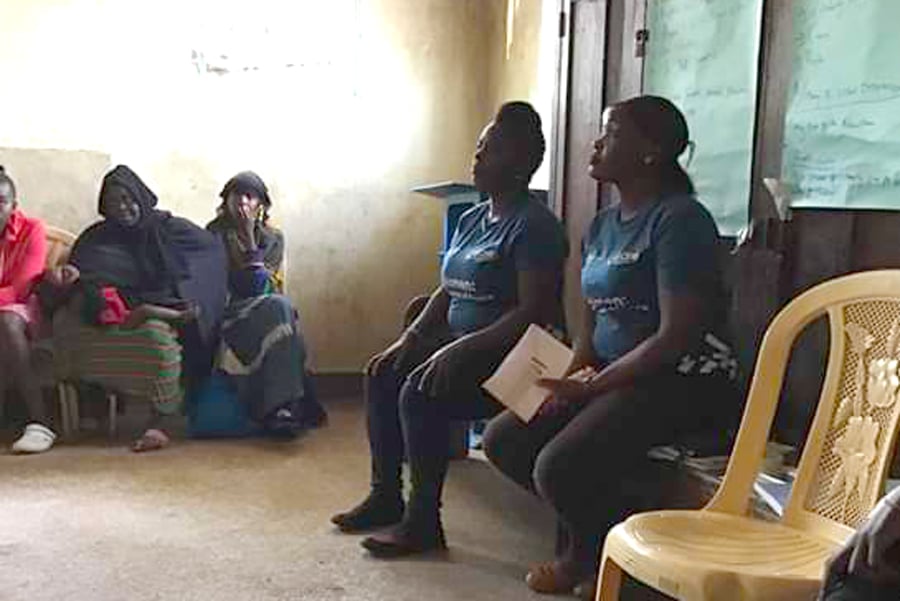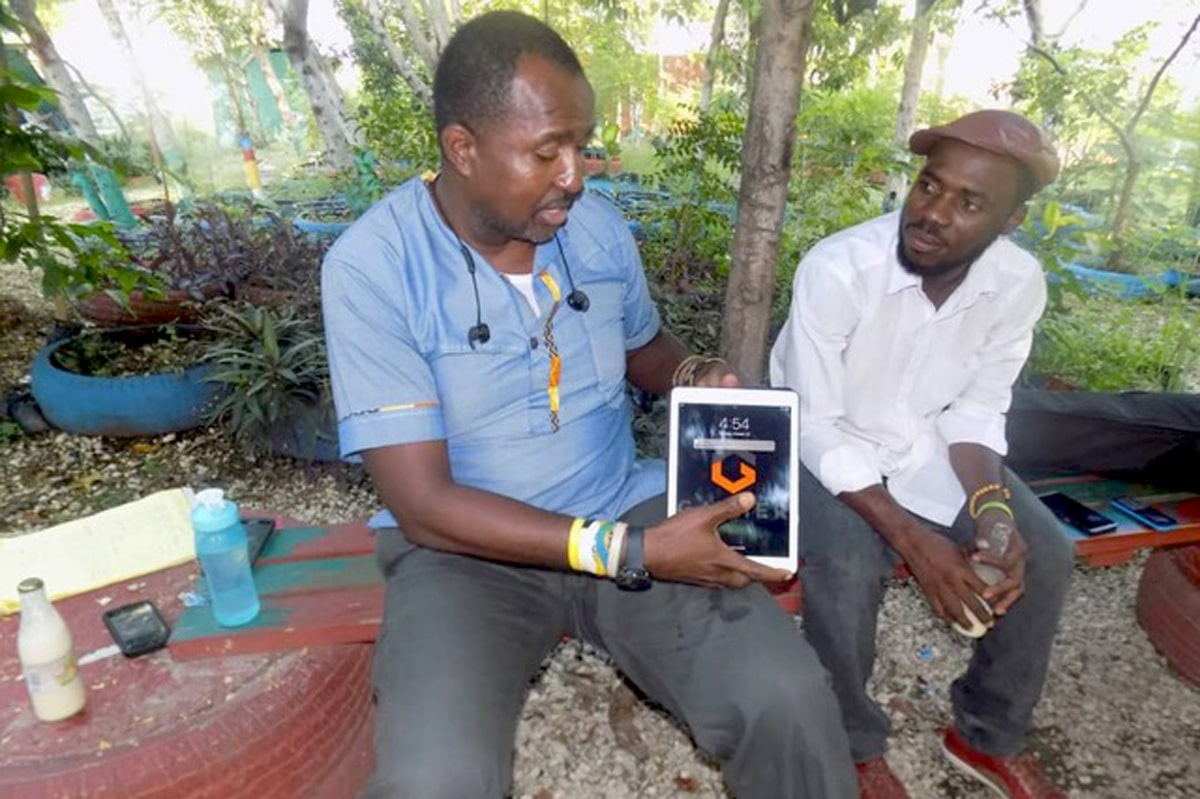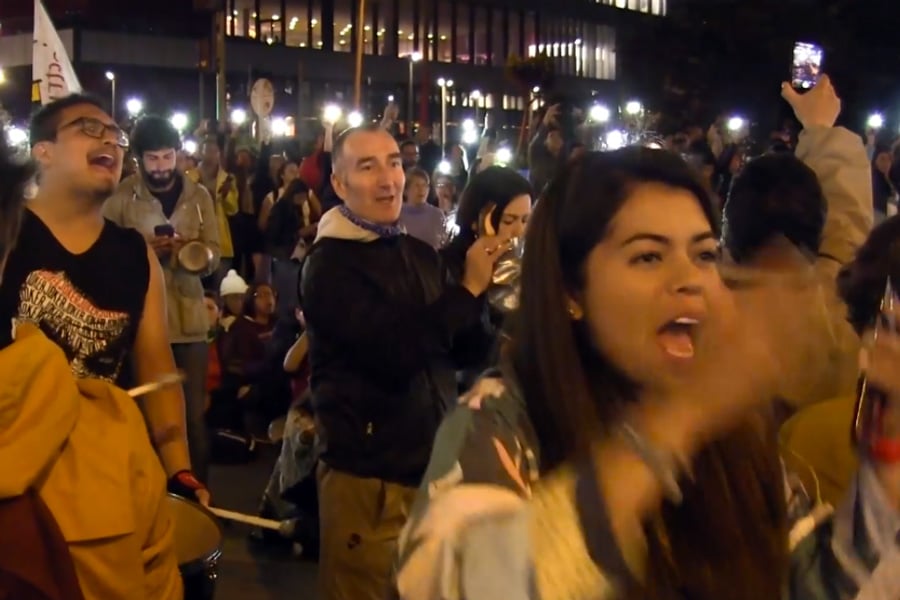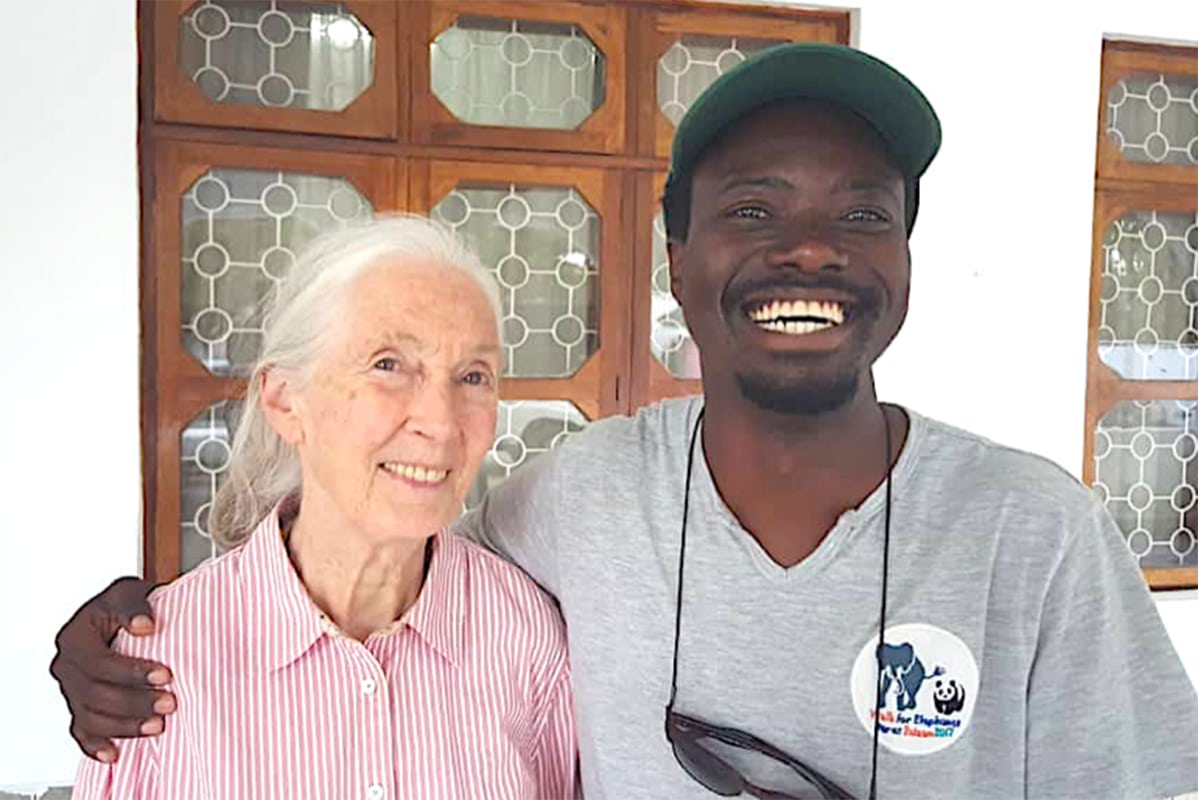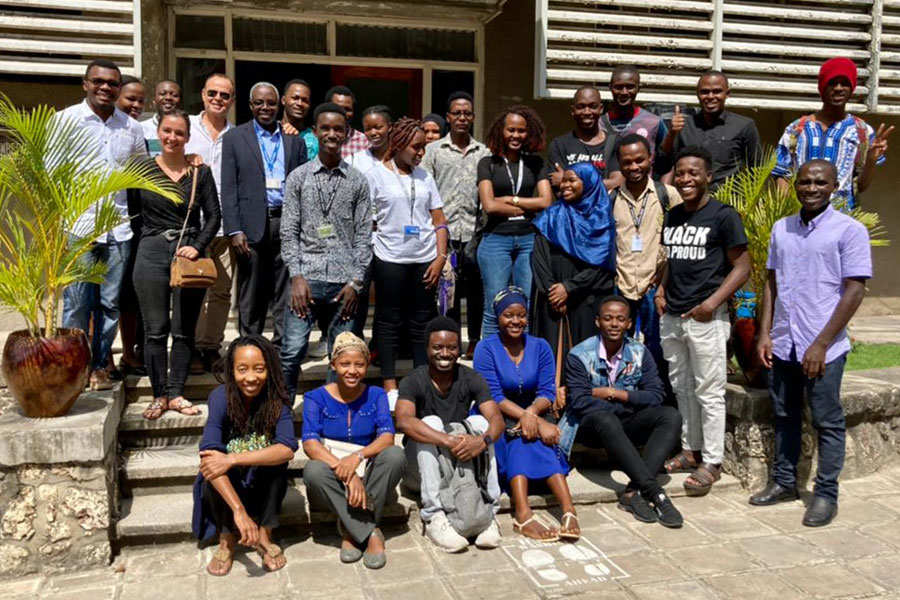Enough is Enough: Fellow Raymond Richard Calls for Peace After Senseless Murder
In the wake of the senseless murder of 9-year old Janari Ricks, Global Goldin Fellow Raymond Richard joined peace builders from across the city to host a call for an end to the violence that is on the rise in Chicago.

The Founder of Brothers Standing Together, Raymond is also a resident of the near north side community where the murder of Janari Ricks took place. The murder hit home for Raymond in a personal way, as Janari is part of his extended family.

This is my community. I came back home to help as many people as I can help and save as many lives as I can save. Unfortunately, his life wasn't saved. So that means we dropped the ball. The men dropped the ball.
In his impassioned plea for the murders to stop, Raymond continued:
But we are here to say today, "Enough is Enough" and it's over with. We will no longer stand by idle while our children are being slaughtered at an alarming rate.

After calling for the shooter to turn himself in, Raymond continued:
To the children: I pledge to do all I can do to make your lives safe, even if it means laying down my own life... We as a people must get involved to stop the bloodshed of our people. It doesn't matter the color. We're dying at an alarming rate and we must take a stand now.
Raymond Richard is an Alumnus of the inaugural class of Global Goldin Fellows in 2018, a cohort of 20 passionate grassroots leaders from 16 countries from Africa, Asia, Europe, the Middle East and North and South America.
Click here to read the watch the video on WGN9 News.
Caught between Two Wars

Over the past four years, I have painfully witnessed my country of Cameroon be ravaged by a steadily escalating war which has displaced thousands of civilians internally, and into neighboring countries. As the president of Community Green Engagement (COMGREEN), I and my colleagues have strived to ensure the communities which we serve not only have sustainable access to food, but also engage communities on existential climate change issues.

In the current period, we have been forced to watch, helpless to prevent the entire destruction of villages because of the fighting. Many flee to places such as Bamenda, where Community Green Engagement has its headquarters. run to the major towns like bamenda where we have our headquarters. Unrelenting gunfire and the sincere risk of interpersonal violence by warring groups makes it nearly impossible for us to work.

Further, due to the deadly clashes which have mostly been in the rural areas, farmers and ranchers have abandoned their properties leading to drastic food shortages. Now, the consequences of the COVID-19 pandemic are upon us as well. Though we have few confirmed cases of virus infection, like too many countries throughout Africa and around the world we struggle with rigorous medical testing for the disease. Additionally, the police and military are seizing the opportunity offered by the pandemic to further restrict civilian movement by enacting curfews, and deep fines for those who are outside of their home without official permission, or subjectively valid reasons. Some have been beaten for these reasons as well.
With the support of the Goldin Institute. Community Green Engagement is launching a FaceBook fundraising drive to secure foodstuffs and livestock for Bamenda and the surrounding areas we serve.

It is a very difficult time for us here in Cameroon, but Community Green Engagement continues to offer resources, training and hope. Before the fighting in Cameroon, between Anglophone and Francophone factions, COMGREEN maintained a beekeeping project, gardening, and oversaw the construction of a community center through regular civilian-focused consultations, Many stakeholders came together to discuss our most pressing problems and collectively come up with solutions. We pray the time will come again soon when we can resume such inspiring outcomes, again.
Click Here to Support the Community in Cameroon
Progress in the Peace Negotiations in the Philippines

The Comprehensive Agreement on the Bangsamoro (CAB) signifies a great milestone of peace negotiations over decades of talks in the Bangsamoro region in southern part of the Philippines. It is significantly the compilation and sum total of all the agreements, declarations, joint statements, principles and mechanisms reached and agreed upon between the government and the Moro Islamic Liberation Front (MILF) from the start of the peace talks in 1997 up to March 2014.

The principles of the negotiation recognized the justness and legitimacy of the cause of over 3,256,140 Bangsamoro people, their aspiration for the meaningful autonomy through a democratic process, the aim of finding a solution to the Bangsamoro question with honor, justice and dignity and the aim to end the fighting between the government and the MILF. The Bangsamoro Autonomous Region seeks to replace the Autonomous Region in Muslim Mindanao (ARMM) with a political entity that shall possess broader powers to address the decades-long aspiration of the Moro people for meaningful self-rule over their ancestral homeland, and that is where the Bangsamoro government now.
The Bangsamoro Organic Law realized another step to continue the infrastructure of peace process as stated in the CAB. This is to put in place and frontline the clear roadmap that will provide direction to transitional justice and reconciliation measures for the Bangsamoro struggle. It serves as mark of the commitment for peace as it proposes conflict transformation mechanisms on the ground.

The existence of normalization bodies in the CAB ensures human security and helps build a society that is committed to basic human rights where individuals are free from fear of violence and long held traditions and values. Under of which is the Joint Normalization Committee (JNC) which undertakes the process of normalization, Joint Peace and Security Committee (JPSC) that develops policies and operational guidelines for the effective partnership of the JPSTs and Joint Peace and Security Teams (JPSTs) as working for the maintenance of peace and order and the stability of the areas mutually identified by the GPH ( refers to Government of the Philippines) and the MILF. On the other hand, Independent Decommissioning Body (IDB) is mandated to oversee the process of decommissioning of the MILF forces and weapons.
The socio-economic programs were intensified on development efforts for rehabilitation, capacity building initiatives, reconstruction and institutionalizing programs to internally displaced persons (IDPs), and poverty-stricken communities. The Joint Task Force for Decommissioned Combatants and Their Communities (TFDCC) was established also to assist the panel to identify and implement socio-economic priorities and development projects for decommissioned MILF combatants and their communities.
The ceasefire mechanism including the Coordinating Committee on the Cessation of Hostilities (CCCH), International Monitoring Team (IMT) and Ad-Hoc Joint Action Group (AHJAG) are collaboratively working in the commitment to a general ceasefire necessitated to the ongoing peace talks and in the ironing out security issues and concerns in accordance with the security protocols agreed between the GPH and MILF. These are the on-going work and established commitment of both parties that will be reinforced its implementation.
There would be struggles in the transition period.
Lo Ivan Castillon
But, the pressing support and collaborative participation of international community to the Bangsamoro government provides significant account on the covenant established and put in place the sincerity of the government leaders to pursue it. There would be proactive and reactive measures in accompanying the transition phase, education, continuing campaign against potential bottleneck and organized working group to explore alternatives.
This would be an opportune time for the Bangsamoro leaders to serve and govern the Bangsamoro community as to ascertain their confidence and capacities on moral governance in responding to basic needs, reducing poverty, bridging social gaps, eliminating anti-social activities, improving human security, improving peace and enhancing unity within the territory.
Opportunities offer to challenge various stakeholders and sectors in government, private and civic organizations to work hand in hand in developing different conceptual issues, methodologies, analytical language and institutional practice and strategic approaches on theory and practice of moral governance in the Bangsamoro government.
The future leaders and general public are called for their active involvement in the exploration of the existing and potential linkages in support to Bangsamoro homeland. Moreover, there is a need to strengthen advocacy on peacebuilding, culture of peace, conflict transformation, active non-violence and peace process as long-term goal through series of campaigns, public consultations, fora, research and information and education campaigns among others. This will provide venue in acquiring rich knowledge, experiences and insights of diverse educational communities to benefit mutually through collaboration and solidarity among all stakeholders.
The processes are not just aiming to have the absence of war but are aiming to have a society wherein social justice prevails, economic system creates equal opportunities to all, ecological balanced establishes, respect and honor for uniqueness of one’s culture, traditions and beliefs and development of full human potentials made available.
Indeed, the CAB is the achievement of the present government that concludes the 16th congress and showcased its relevance to peace process and to the Bangsamoro government. As Bangsamoro, there are more to do, more opportunities to grab, more collaborations to link with, and more advocacies to work on towards the Bangsamoro aspirations to have shared vision (with the national government for national unity and reconciliation and within the Bangsamoro for peace and economic stability), shared leadership, good governance, improved peace and security, adequate and proper management of resources and more inclusive dividend of peace.
Responding to COVID-19 in the Bedouin Community

As a minority group within Israel, the Bedouin Community has had a long history of strife in dealings with the Israeli government. During these dire times of Covid-19 the government has failed in many areas to support Negev Bedouins through funds resources and information. As a result many families have been facing unemployment, health and communication concerns. Students who do not have computers can’t do school from home households with over ten people are having trouble with social distancing and unrecognized villages are unable to maintain a sanitized environment due to limited water.
A New Dawn in the Negev has been taking action in three areas:
- Established an emergency Covid-19 Hotline for receiving calls from those in need of urgent care and assistance;
- Proactive outreach through our call-center, managed by our staff and volunteers, to reach out to those that might feel apprehensive or afraid to cross social norms; and
- Building an online platform, still in process, that will generate opportunities to share initiatives, hold discussions and promote peer to peer volunteer ideas.
Through all these approaches we provide both structural and culturally-sensitive opportunities to express their needs and find responses based on solidarity.

[quote]A New Dawn is actively involved in the fight against Covid-19, and our work is effective because we have trust and local knowledge earned over years of experience working with vulnerable communities.[/quote]
We are more than happy to share our knowledge and experiences and coach other organizations who are facing similar situations and obstacles with social-governmental tensions. By working together, we can become stronger and more equipped for our work indivually and collectively. A New Dawn in the Negev is always seeking new connections for resource building and sharing.
A New Dawn’s biggest obstacle now is infrastructure and resources for our current endeavors. We’re working on a phone switchboard, computer tablets, hot line operating software and other activities, as well as an Internet platform via WhatsApp to build online community, and subscribing to an existing platform while adapting to the specific needs of the Bedouin company and training a limited team of operators.

We need to urgently respond to this crisis today, but we also have to rethink our work for the future.
Even before the coronavirus hit our community, our organization was often short on resources, facing neglect from the government, and having to deal with already high unemployment rates and poverty. Now the Coronavirus has given us no choice but to quadruple our efforts and prioritize our programs. We have to safeguard our infrastructure and make it adaptable to the new social norms of social distancing. Before the crisis, meeting people and engaging with them was paramount. Now, we have to apply all our work to a virtual world.
For our community as a whole, the crisis has impacted our way of life and culture. Now more than ever, cultural competency plays a role in the future of our people; we must not forget who we are.
During this time, we have grown virtually connected with our world more than ever before. Our experiences are in need of being shared to others through this heightened medium of communication. Connecting to my network of Global Fellows is critical in this time of physical isolation and the Goldin Institute is definitely one of our greatest partners. We wish to strengthen our ties with all the alumni and otherpartners to build a better future together.
READ MORE:
- https://fathomjournal.org/fighting-back-against-covid-19-in-the-bedouin-community/
- https://www.makorrishon.co.il/news/213227/
- www.b7net.co.il
- https://www.facebook.com/watch/?v=218873629470984
Kenya-based GATHER Fellow Empowers Women
Kenya-based GATHER alumnus Mariam Ali Famau has a special activity planned for International Women’s Day on March 8. Mariam lives and works in Majengo, an impoverished but resilient community on the outskirts of Nairobi, where she has launched many innovative projects designed to empower women who are at risk for recruitment into violent foreign extremist organizations.

In recent months, Mariam worked closely with Arigatou International, a longtime partner of the Goldin Institute, to recruit more than 110 women and girls for “Women of Faith in Action: Building Family Resilience.” Hosted by Arigatou International and the Global Community Engagement and Resilience Fund, “Women of Faith in Action” provided participants in Nairobi and Mombasa with practical training in entrepreneurship and the other aspects of business development. Women in Majengo and similar communities face dire poverty and a lack of opportunity that leave them vulnerable to enticements from foreign terrorists based in nearby Somalia. Christians as well as Muslims are at risk for radicalization because of their economic desperation.

Mariam is a single mother with limited resources, but she is deeply committed to changing the lives of the young women she works with. Her efforts are always inter-generational, reaching both children and adults, and she regularly draws large groups to her gatherings.
“We want to have an impact on our community,” she said in a recent phone interview.

To support the women who have already completed the training programs and are starting their businesses, Mariam is launching an open consultancy that will provide advanced guidance and other services. One group of former graduates are opening a car wash, and Mariam has already helped them open bank accounts, and write a business plan.
“Women washing cars – it’s unique,” she said. “It hasn’t been seen in the whole country.”

As the first enterprise of this kind to be created by women, Mariam is certain the car wash will make a big impact. But three other groups have opened accounts, and two others have written business plans. The consultancy will grow along with these businesses and as more women are inspired to try to realize their financial dreams.
“Our first priority will be transparency,” she explained.

Mariam has big plans for International Women’s Day on March 8, when she and other volunteers will visit an area orphanage. The orphanage houses both Christian and Muslim children who have lost their parents through a variety of circumstances, and Mariam plans on donating clothing and hosting a sizeable feast. As always, the need is greater than the funds she has available, but Mariam trusts that she will find what she needs.
“Instead of celebrating, we will do a visit to the nearby orphans,” she said.
Thank you to those who stand with Haiti
By Daniel Tillias, Goldin Global Fellow, Haiti
A letter to the Goldin Institute's global network of champions for community driven social change on the 10th Anniversary of the earthquake in Haiti
Thank you for keeping your promise.
After the earthquake, ten years ago, a lot of promises were made. I remember people saying that out of this terrible tragedy a new way of doing things, a true solidarity with Haitians, would emerge. They said we would “build back better.”

But too often and so unfortunate this did not happen. Only a tiny percentage of the resources pouring into Haiti after the earthquake went to grassroots Haitian-led groups like SAKALA, the people who were in the best position to know the conditions on the ground. Too often groups like SAKALA were forgotten and we continue to be forgotten by some of the largest donors.
But you did not forget us. Time and again we have treasured not only your support but THE true solidarity – the tougher the times, the more you are there for us.

I am SAKALA, the children in Cite Soleil are SAKALA , you are SAKALA , we are all SAKALA, all together we contribute to the only promise that has been kept, not the charity one but the solidarity one. The one that allows SAKALA to continue being home of the largest urban garden in the country, the hub supporting the largest waste revalorization initiative in the country, the place where butterfly, dragonfly and birds to share with the children there the hope they can fly and will.

Thank you for this solidarity, thank you for inspiring such a difference in Cite Soleil my home town. Happy New Year of continuing effort making the New beginning of Haiti happening in Cite Soleil.
Be the change!
Daniel
Colombia Protests Inequality
By Lissette Mateus Roa, Co-Facilitator, Global Alumni Network
Colombia is the third most unequal country in the world, and the gap is growing. That is what is causing the latest mass protests in the country.
Colombians no longer care about FARC guerrillas, they no longer protest nor fear this group that signed a peace agreement with President Santos 3 years ago. Now, Colombians have turned their eyes to the real problems that afflict the nation; a health care system that does not work, little chance of education, inequality, impunity and especially corruption. Above all, it is the corruption of politicians that keeps the country in a precarious state because the money that should be available for the benefit of a country is stolen by a few and the government persists in benefiting those few.

President Iván Duque, who was the candidate of the former president and now-Senator Álvaro Uribe Vélez, has neglected the peace agreements, has not complied with them, and instead has allowed new illegal groups in the country to start arming again to fight for routes of drug trafficking and land. Because of that, there are newly displaced people and new massacres again. In addition, due to the tax reforms that Ivan Duque is presenting before the congress and a new law lead by the political party of former President Álvaro Uribe, he has shown that it is a government that aims to favor the richest, widening the gap of inequality in the country.
There are specific requirements that are being presented to the government and for which the huge protest marches began on November 21, 2019:
- Reduction of war budget, which is larger than the health budget even though the FARC no longer exists.
- More budget for higher education, because only 10% of young lower social class students enter the university and only 48% of those are from official schools.
- That the government complies with the peace agreements, and stops the killing of demobilized people. Already 130 have been killed in the last 2 years.
- That the government stop the genocide of indigenous people and systematic murder of social leaders in the country. 134 indigenous people and more than 400 social leaders have been killed during the government of Iván Duque.
- That the government stop widening inequality gaps. That it desist in the tax reform (called the package), which raises taxes for the middle classes and lowers the taxes of large companies. It could reduce the salary of young people under 25 years old to 75% of the current minimum, eliminate the pension funds, and left with precarious work to the independent ones that are around 40% of the country workers.
To understand this reform a little more, along with the new law, it is important to know that in Colombia, 1 hour of work is paid 1 dollar, and the minimum salary is 236 dollars per month, but a congressperson in Colombia is paid 9,531 dollars per month, this means 40 time more than a minimum salary. The law proposed by the government pretends to make a flexible minimum salary, and have young people working per hours, or part time, which is going to be cheaper for employers, but precarious for workers who would have monthly salaries of less than 236 dollars. The government said it is a way to have more jobs for unemployed people who currently are 10% of population. Apart from that, they said they will reduce from 48 to 45 hours a week of work, but this is going to leave workers without two days a year in payment, which they used to have for having time with their families and without 2 extra hours a week of recreation. Moreover, workers won’t have Sunday as their rest day, but it could be any day of the week, even if they would not have time with their families because their day of rest does not match with their families’. And they won’t have payment for holidays either.
On the top of that, with the tax reform, the government wants that independent workers, which in Colombia is half of the workforce (about 11,800,000 people), pay 19% in taxes over their salary, knowing that they already pay about 21% of their salary in VAT and payments of health and pensions. Meaning that if an independent worker has a monthly income of 3,000, they should pay about 40% of their salary in taxes, VAT, and parafiscal contributions. While this happened with independent workers, the big enterprises will have a reduction in their tax payments from 33% to 30%, which will amount to a little bit more than 2 and a half billion dollars, which is double the budget for the country's university education, if we want to compare it. Another proposed law states that if companies hire young people less than 28 years old, they would have a 120% deduction on payments. In this sense, under this reform, along with the before mentioned proposed law, companies could hire people for less payment and less obligation, and they would have more deductions. What a great government for big companies!
Apart from that, the products already have a 19% VAT. For example, one gallon of petrol costs 2.60 dollars. All of this is going to widen the inequality gap and will make the rich richer, the middle classes unable to obtain more, and the poorest even poorer.
Despite all of the above, the government says it does not understand why citizens want to protest. For this reason, since the first march on the 21st, police and ESMAD (Mobile Riot Squadron) forces were deployed during the peaceful marches during the day. Because of that, citizens started a “Cacerolazo” from home, a form of protest in Latin America in which pots with spoons are beaten to make the government feel that the protestors are not vandals but an entire nation from their homes protesting peacefully. This sound was heard and spread throughout all neighborhoods and cities in Colombia.
To give you a sense of what these peacedful, if noisy, protests looked like, please watch this video taken at the street level and this video showing an overhead view.
On November 22 again there were marches and there were riots in different parts of the city (see video here). In the evening, President Ivan Duque decided to generate a general curfew in Bogotá and militarize the city. Somehow, a panic campaign was created – we still don’t known by whom it was orchestrated – through social networks, calls, and people entering residential complexes. It was said that they were going to destroy houses and that they were going to steal. It was a night of panic for the entire Bogota City. The next day, the mayor of the city said that all the alert calls were a lie and that it had been a dark campaign to generate chaos in the city.
After that night, many were afraid to go out and march. However, the marches continued on November 23, and in the afternoon hours, Dylan Cruz, 18 years old, was shot in the head by the ESMAD. Dylan was about to receive his high school grade on November 25, but instead, due to the impact, his body did not resist any more, and he died on his graduation day.
Despite all these marches and events going on, the president had said in his speeches he wanted to establish a dialogue. Last week, in the middle of the strike, the president passed the tax reform to the congress, and it was approved in the first plenary. The aforementioned law was also approved. In addition, the housing subsidy for the middle class was removed, and a law was passed to the congress so that the ESMAD could have more riot weapons. And the cherry on the cake was a law called Andrés Felipe Arias, named for a former minister of agriculture of prior President Álvaro Uribe, who was accused of giving land that should be for the poor to the rich, a scheme from which Alvaro Uribe Velez himself benefited. Andrés Felipe Arias was imprisoned in the United States and found guilty, as he was found guilty in Colombia. However, this law will allow him and many other corrupt individuals out of jails or house arrest and shorten their sentences.
Faced with this mockery and interweaving of laws and reforms to benefit a few, Colombians have not stopped marching.
Last Sunday, December 8, a march was called, that was supported by artists and was massive. The marches and protest will continue, but the government does not want to listen.
So, in this moment, we ask for international support for Colombian people. As Desmond Tutu said, “if you are neutral in situations of injustice, you have chosen the side of the oppressor.”
Chapter 2 of the Polar Bear Talks: tales of an epic trek from Africa to the Arctic
By Yusuph Masanja, Global Alumni Coordinator
Welcome to the second chapter of my epic trek!
Click Here to read the first chapter of Yusuph’s journey to the arctic, which was supported by his mentor, Dr. Jane Goodall, and the expedition was led by Sir Robert Swan, founder of the 2041 foundation, environmentalist and polar explorer, the first person to walk on both poles. The expedition included individuals from 27 countries, but Yusuph was the only one from Africa.

“Is the Ice truly melting?”
After I returned from my Arctic journey, Ian, one of my friends in Dar Es Salaam, paused during his partner’s birthday dinner and asked if the arctic ice was truly melting due to climate change, “because at least you have been there, so, I can believe if you say it’s true.”
It conjures up mistrust when, on an everyday basis, what you hear from media and some elites’ debates is mostly news to justify inaction in the face of the problem. Furthermore, it is sad to see that some of those who agree and are dedicated to working towards solutions are continuing to treat the issue as some sort of a “future problem” – contrary to our current reality as we know it. It is due to such inaction that we are continuing to see a continuous rise in global warming levels every year despite a number of international treaties signed and interventions implemented.
My country is already experiencing the impact of the climate change with annual events that cost in excess of 1% of GDP each, affecting millions of people and their livelihoods (Tanzania’s first INDC). My government analyzed the cost of mitigating the impact on public health, energy supply, water resources, agriculture, etc. to be approximately USD 60 billion by 2030 in mitigation investment. And this is a story of only one African country, so one might wonder, “What’s the story of a whole continent at large in line with mitigation and adaptation capacities?”
So, yes, homie – the ice is truly melting. I can report that myself having been there this past June!

26 countries united, for one bold, audacious and humanity’s most important quest.
Transforming the global economy into a more climate resilient path was one of the goals that brought us all together. We spent two weeks gathering and learning about the scientific facts, inspiring each other with our track records of efforts to shaping the future, and discovering innovative solutions for the planet.
In one of my reflections, partly due to a question from a friend I had met, I found myself contemplating the feeling of being trapped on a ship far from home with zero possibility of leaving should one of us feel bored, agitated or just happened to dislike someone! I began using this analogy to the ongoing discourse around climate change and how all of humanity has no other planet to escape to, should warming impact becomes most catastrophic. My instinct, as a consequence of experiencing this feeling, was that I should do my best to understand everyone around me on the ship and strive for coexistence to successfully move ahead together towards a common goal despite our individual differences.
Such instinct gave rise to a newly adapted frame of thoughts pertaining to how humanity must treat one another in order to solve the climate crises sustainably. The frame contained a value of responsibility in extending ourselves spiritually towards the growth of our collective well-being. And by so doing, discovering how our dialogues and actions shall improve as a consequence of truly listening. Listening to the people around us, to the world, and to the planet – because that’s what our extension will do to us, and it is good.

Storytelling for Change
Throughout the expedition, we harnessed the power of storytelling to communicate convenient solutions and climate resilient pathways. Kyle, one of the team leaders, led a crucial series of story-telling coaching, which rendered me the first on spotlight! I had to come up with a story from a picture I had taken previously when we visited the Fram Museum while incorporating principles of storytelling in my reflection. Considering my nervousness and self-conscious tendencies while on stage, the challenge was helpful in building my confidence and public speaking skills.
The story of the Norwegian polar exploration and the ship “Fram” was remarkable to me, given the sophisticated techniques used to navigate to North and South poles in the 1890s. I was impressed by the ship’s design and most importantly its preservation so that we, and future generations, can visit to see it in a museum.
The story captivated me so much in that, as bad as things might be going now for us, we have gone so far past radical adversaries that faced us historically and, perhaps, if we – just like the “Fram” explorers – could harmoniously work together, the climate crises will be addressed.

The Polar Bear Talks
Africa’s proverbs are still shaping my society as they provide best moral conducts as well as important explanations on various misfortunes. Naturally, we don’t have polar bears in Africa, but the following proverb “Rain does not fall on one roof alone” crossed my mind when I stood in a zodiac looking at a family of polar bears.
The proverb explains a natural cycle of life in a metaphorical manner. Its meaning, “Trouble does not discriminate. It comes to everyone at some point,” struck me. I knew, from the polar bear presentation given by one of National Geographic guest speakers, that these animals help keep our ecosystem’s health at balance. Hence, their endangerment indicates that something is wrong in the broader ecosystem. Their home is melting twice as fast as other parts of the planet. Being on top of the food chain, them being at risk, places other species in the ecosystem at risk too.

Just like how our elders would speak such proverbs to children to teach them a lesson, I felt sort of hearing the same coming from the elder polar bear as we quietly stood watching them. It’s obviously the case that our homes are in as much danger as polar bears’ habitats; the impact is being felt in most parts of the world already. Yet another Swahili proverb contains enough wisdom to help us through, “Where there's a will there's a way.” Maybe, if we get our intentions clearer than we already have right now, then humanity will prevail and reverse the change.
The Disciplined Voice Said, “You Are in Charge of Africa”

Sir Robert’s final remark to me, “You are in charge of Africa,” on the last expedition day in Oslo generated a sense of broad responsibility within me. For once, I began to think not only of Tanzania, but Africa at large. For once, the wise words of Mwalimu Julius K. Nyerere and those of Nelson Mandela started to emerge from my subconsciousness. These are two people I know to have striven for a free continent. Such freedom is now in jeopardy, as African economies tap on pathways that led “developed” economies to their current emission levels.
Upon my return back home, I started talking and thinking about ways I could make my contribution counts. A friend’s mention that became a mantra: “You have a responsibility to all Africans who were not as privileged with the opportunity to witness and learn about climate in the Arctic, and who have no idea about its implications” started to dawn on me.
So, to begin with, I spoke with a few students and teachers in Arusha, Tanzania. The conversation helped me to discover a goal to work towards: Engaging young influencers into experiential training programs on sustainability. I have started working on creating Africa’s center for climate change awareness in Tanzania to engage young people in sustainability education.
Learn more about the expedition on the following short videos:
Yusuph and Robert Swan at the Arctic Cycle by Kyle O'Donoghue
Climate Force video about the expedition Kyle O'Donoghue
Also, feel free to connect with me via facebook at facebook.com/masanja.yusuph
The Polar Bear Talks: tales of an epic trek from Africa to the Arctic

The First Chapter
My Arctic voyage this past June strikes me to be a dream like sensation, more than 4 months later and I am still dreaming a variation of the same tale – humanity on the edge! For nearly a year, I dreamt, attempted, gave up, whined, and eventually buried the hatchet and acted –succeeding to raise enough to afford the expedition. To go and learn (with all my senses, I technically mean it: all senses) about climate change ramifications, and to return home with an insight for actions I can take to save my local planet. An experience that recounts in the most surreal manner to me!
My journey was led by Sir Robert Swan, founder of the 2041 foundation, environmentalist and polar explorer, the first person to walk on both poles, together with other, amazing individuals from 27 countries.
I was the only Tanzanian and the only participant coming from Africa!!!
The trip was so rich with the right information about climate change, its impact and solutions –at both micro and macro levels. The leadership on the Edge training by a notable coach from New York and guest speakers from the National Geographic team - naturalists, scientists and educators - were equally superb.
Coming back home felt a little strange. I missed the freshness of the Arctic air, the all-time midday sunlight, polar bears, whales, birds and the ice. I also missed the daily dose of yoga and meditation.
Climate change does not cause global warming, per se. It is highly connected to social justice in general. Poor communities are experiencing the impact far more than wealthy communities. But that's only part of the story. The other part of the story is that at-risk poor communities are resilient beyond belief and from them so much can be learned about mitigation and adaptation.
With this nexus of Climate change and social justice, I am working to bring a convenient solution by establishing a sustainability learning center targeting young influencers.
I’ll have more to say about the actual journey in future chapters, and there are some videos of the trip below, but it was important for me to issue a note of gratitude first.
One of the most important persons who made my journey possible is Dr. Jane Goodall. One evening, as she and her colleague Dr. Anthony visited Dar Es Salaam, we sat on the porch of her house. Among our many discourses, I asked if she knew Sir Robert Swan. Of course, Dr. Goodall responded, “Yes.” She continued speaking highly of Swan’s mission to shape the next generation of youth by taking them to the Antarctic. I retorted, “By the way, I have applied to go on their first expedition to the top of the world, but I doubt if I can successfully raise required funds.” She looked at me and said, “I can help you with a recommendation letter.” That moment, my heart smiled and part of me knew that I was destined to go.
Of course, this could not happen with a recommendation letter alone, I had to work 16 to 18 hours every day in May this year, getting past all criticism and shame for not having started fundraising much earlier when I had time. I had quit my job at this time and I had all the time I needed to logically deal with such heartbreaking criticisms, strategically manage my time and resources to ensure I reach out to everyone I knew to have their heart at the right place (whatever this might mean at the time) and it worked.
The lesson, I think, is this: “Perhaps, to encourage successfully applicants (of educational opportunities) to also cover their costs and provide them with professional fundraising guidance, is (more than anything else) to help them become more attentive, engaged, intellectually critical and useful in their communities after the program.”
I will share another chapter in this unfolding story soon, but in the meantime, please watch the short videos below to learn more:
The First Chapter by Kyle O'Donoghue
Just 600 miles from the North Pole, Sir Robert Swan interviews Yusuph about his concept of a sustainability center in Tanzania. “You’re going to address this whole thing of people and animals in the wilderness. It’s going to be a practical thing,” Sir Swan said. “People in this world don’t need to be talked at - they need to be shown solutions and I’m so proud of you.”
Arctic Expedition: Recruiting the Next Generation of Climate Activists by Madeleine Ptacin
Yusuph’s polar plunge experience by Trent Benson
Best of all, click above to watch take a dip in the cold blue waters of the arctic.
GATHER Alumnus Lo Ivan Castillon Shares Update from the Philippines

Greetings from Phillippines!
The Volunteers’ Initiatives in Bridging and Empowering Society (VIBES) is pleased to share with the Goldin Institute’s supporters about our activities in September 2019.
What were the highlights from your work this month?
VIBES through its Chairperson, Lo Ivan Castillon, participated in the Consultation Meeting as an organizational member of the Technical Working Group in the finalization of the Bangsamoro Transition Youth Priority Agenda (BTYPA) of the Bangsamoro Youth Commission (BYC) of the Bangsamoro Autonomous Region in Muslim Mindanao (BARMM) on 13-14 September 2019 in Kutawato Resto, Cotabato City. The objectives of the activity were to present and discuss the draft document and arrive at a final version which can be presented and discussed with the youth-serving ministries and development partners. BYC Executive Director Marjanie Macasalong, PhD, also a member of parliament, was in full support of the crafting of the BTYPA as a transition plan for 2019 to 2022. It was supported by UNICEF and UNFPA.

There were five priorities - health, education, peacebuilding and security, governance, and active citizenship. The peacebuilding and security priority ensures the promotion of human security, inclusive disengagement with reintegration programs, and the prevention of youths from association in armed groups, including participation in peacebuilding, conflict prevention and management initiatives, as well as safety efforts and development in the Bangsamoro region that contributes to national peace and security. It also integrated the youth, peace and security in all the strategies, objectives and programs considering the current and relevant issues confronting the youth in the region.
The draft BTYPA was presented to the ministries and offices of BARMM and to the development partners in the region on the 16th and 23rd of September 2019, respectively. Also, VIBES, as one of the members of the Technical Working Group of the Kutawato Messaging Hub, had a strategic planning on September 19-20, 2019 together with other CSOs and government agencies in Cotabato City and provinces of Maguindanao and North Cotabato. Hosted by Moroprenuer Inc. in the Bajunaid Building in Cotabato City, the activity was initiated and supported by the Equal Access International Philippines.

The Messaging Hub was also officially launched on the 20th of September with the goal of engaging grassroots communities on peacebuilding in the BARMM. It has the following outcomes:
- Increased community engagement in the normalization process and in the transition of BARMM
- Increased participation of youth and women in promoting peace
- Improved community socio-economic condition through social enterprise promotion
- Established positive and interactive community platform for information sharing and advocacy development
What activities were organized?
- In line with the celebration of National Peace Consciousness Month and International Day of Peace, VIBES conducted Basic Peace and Conflict Workshop for Children to 53 young leaders of Notre Dame Village Central Elementary School (NDVCES) on September 25, 2019 on the NDVCES grounds in Cotabato City. Several activities were facilitated where young leaders enjoyed and had fun during sharing and discussion sessions.
- September 5 October 5 is the celebration of Teachers’ Month. VIBES officially launched “Message for My Teacher” where the public were invited to share their messages to their teachers and take a selfie photo with them to be posted on their social media pages.
- VIBES is one with the world in striking for the climate. As part of our strike, we are challenging our fellow Vibers to take a video of themselves stating their commitment to save the environment and challenge 3 friends to do the same. This is an online platform campaign.

Thank you and more power!
Sincerely,
Lo Ivan Castillon
+VIBES Philippines
